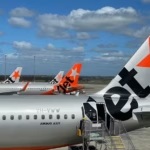You may have come across the word “slots” when reading about aviation news. But what are they exactly and why are they so vital for airlines?
Slot: airlines’ right to land at a specific airport
According to the Cambridge English Dictionary, a slot is an amount of time that is officially allowed for a single event in a planned order of activities or events. In aviation, this word refers back to the time and space a plane needs to land, park and take-off from an airport. Slots are necessary to orchestrate the world’s air traffic and they are also essential to avoid airport congestion. What you may not know, is that there are two types of slots, namely airport slots and airway slots. Let’s give them a closer look.

Airport slots
The airport slot is the time range an airline is allowed to land and take-off from an airport. These time windows are always assigned to different airlines before the start of a specific timetable period. The number of slots an airport is allowed to assign depends on various factors, including the number of runways, the terminal(s) capacity or a potential night flight ban. To give an example, let’s imagine an airline operating a daily scheduled service to an airport needs 14 slots, one for arrival and one for departure for each day of the week. Let’s consider that for the financial year (FY) 2019, Ryanair reported an average of 2,164 flights per day; the Irish low-cost carrier sure needs heaps of slots to operate its flights.
Slots are split up between airlines based on the so-called Godfather’s rights. Such rights derive from the history of slots utilisation. If a carrier does not use at least 80% of the slots it was assigned in the prior timetable period, it loses all of them. At this point, the airline’s slots will be re-assigned to other airlines interested in flying to that specific airport. More precisely, 50% of these slots will be divided between airlines already operating in that airport, while the remaining 50% will be offered to new airlines.

On the other hand, if the airline uses 80% or more of its slots at a given airport, it can keep them for the following timetable period. In 2008, the European Commission allowed secondary training mechanisms in Europe (communication 672/08), something the UK was already familiar with. This decision gives airlines in Europe the possibility to sell those slots they are not willing to use to other carriers, even though airlines do not formally own them. For example, London’s Heathrow airport is famous for the inestimable value of its slots: a single one can be worth about £ 26 million. No wonder that slots are one of the most important assets for an airline.
Moreover, airport slots are essential for the network planning activity of a carrier. Without slots, airlines are unable to fly to specific airports at a specific time, making it impossible for the airline’s management to plan routes. Given the importance of slots, the International Air Transport Association (IATA) hosts a conference half-yearly, the IATA Slot Conference (SC). This meeting is the most significant event organised by IATA, whose aim is to offer a slot assignment forum.
The Airway slot
To understand what airway slots are, we should imagine the sky as a crossroad of flight corridors. Such corridors need to be organised so that they do not get congested, for example, because of disrupting events, such as storms, which need to be avoided, or volcanic eruptions. In these scenarios, the Directorate Network Management (DNM), i.e. the air traffic controller of the European Organisation for the Safety of Air Navigation (EUROCONTROL), assigns airway slots of about 15 minutes for all planes which need to fly through the same corridor. During this time range, each plane needs to perform its flight.

Thanks to this method, planes do not fly unnecessarily and, therefore, they spare fuel, with positive consequences not only for the airline’s balance sheet but also for the environment.
Do you think slots are a good way of orchestrating air traffic around the world? Let us know in the comments below.









